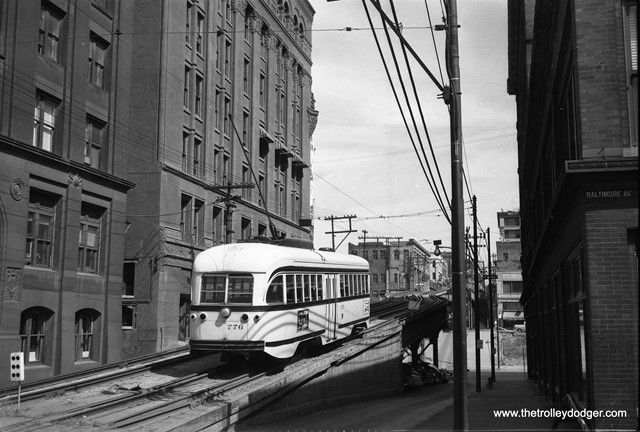
sister car No. 776 on elevated line in Kansas City - thetrolleydodger.com
- Builder
- St. Louis Car Co.
- Description
- PCC, Post-war all-electric
- Secondary Use
- None
- Type
- City and Suburban Streetcars
- Year
- 1946
- Retired from Service
- 1985
- Acquired by the Museum
- 2011
- Fund
- 714
Kansas City Public Service Co. 764
From Kansas City, Missouri
History
Kansas City had a relatively extensive streetcar system. At its peak in the 1920s, there were some 750 streetcars and over 300 miles of track, including routes across the state line in Kansas City, KS. No. 764 is one of 184 PCC streetcars purchased by KCPS to replace older cars starting in 1941. The PCC car takes its name from the Electric Railway Presidents Conference Committee established in the early 1930s to design a modern, streamlined streetcar. It was a successful design with approximately 5000 PCC cars being built between 1936 and 1952 for systems in the U.S. and Canada. Some PCC cars built after World War II used the all-electric variation having electric brakes instead of the earlier air-operated brakes. No. 764 was part of a 75 car order of all-electric PCCs purchased by the Kansas City Public Service Co. in 1946. The company liked the look of its 1941 PCC order and requested that St. Louis Car Co. build the new cars without standee windows as was then standard. Instead, the Kansas City cars had large picture windows with a blue glass sun shade across the top of each window. These cars initially operated on the Country Club Line and on routes crossing the state line into Kansas. Streetcar operation in Kansas City ended in 1957.
As streetcar operation in Kansas City wound down in the 1950s, the company sold the 700 series all-electrics to several buyers. In 1955, forty cars, including No. 764, went to the Philadelphia Transportation Company in Philadelphia. Philadelphia re-gauged its cars to 5’ 2-1/2” and repainted them to the PTC’s green and cream paint scheme. For years they operated primarily on that city’s route 50, an important north-south line. The cars were randomly renumbered into the 2251 - 2290 series in Philadelphia, with No. 764 becoming 2289. .
Trolley Valhalla, a museum group at Tansboro, NJ acquired PTC No. 2289 in 1967. No. 2289 served at the museum’s gift shop with an HO layout inside. In 1972, Trolley Valhalla moved to Jobstown, NJ. Trolley Valhalla folded in the mid-1970s, and No. 2289 went to the Geigertown Central Railroad Museum at Geigertown, PA. This was a collection of railroad equipment headed by David Shirey. No. 2289 sat in a field, apparently unused. Seashore acquired the car in 2012. At the same time, Seashore acquired KCPS No. 781 which had gone to Philadelphia as No. 2278. East Penn Valley Traction and later the Electric City Trolley Museum in Scranton, PA had owned No. 2278 after its retirement. Seashore hopes to combine the two cars, each of which is incomplete, into one complete car, which will bear KCPS number 764. This will be an ambitious project but will result in the preservation of one of these different looking PCCs.
Technical Information
- Seats: 51
- Control: Westinghouse XD423E
- Brakes: Electric
- Compressor: None
Trucks
- Number: 2
- Manufacturer: Clark
- Model: B2
Motor
- Number: 4
- Manufacturer: Westinghouse
- Model: 1432J
Weight and Dimensions
- Length: 46’ 5.00"
- Width: 8’ 4.00"
- Height: 11’ 7.00"
- Weight: 37800 lbs.
© 1998 - 2025 New England Electric Railway Historical Society. All Rights Reserved.